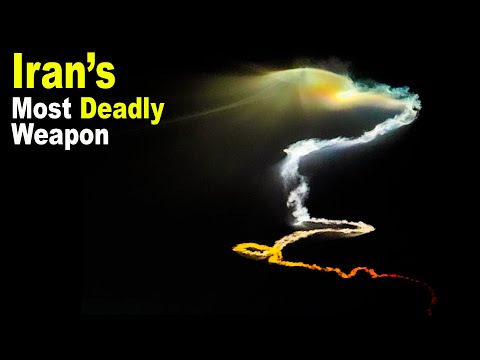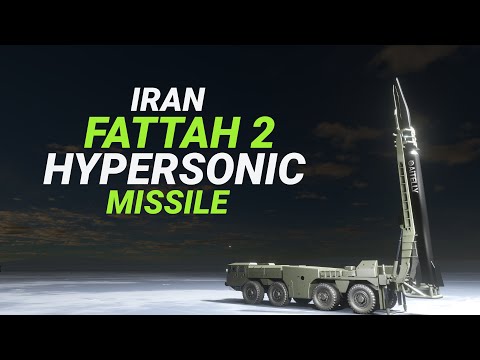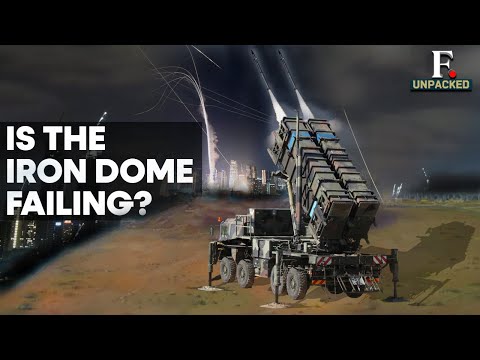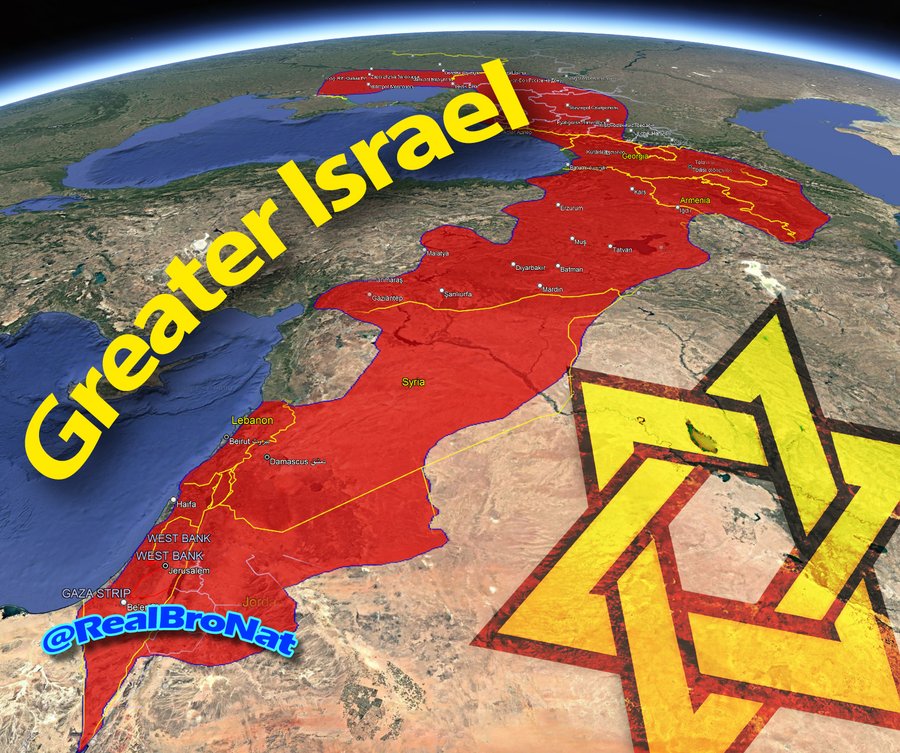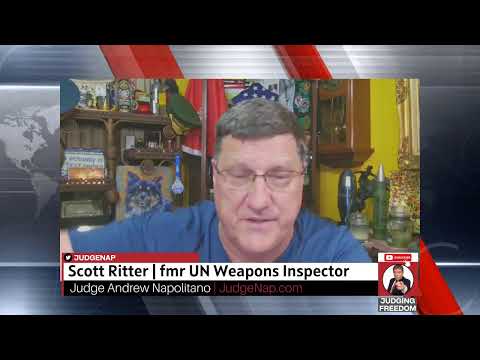By Mike Whitney
The Unz Review
July 12, 2025
The Iranians have proven beyond dispute that they are capable of delivering large-warhead hypersonic strikes with high accuracy. And while it remains to be seen how many of these top-shelf missiles they truly possess and what their rate of production is, the bottom line is that Iran has achieved a major strategic victory which carries a strong deterrence effect in its wake. With each passing month, the Iranians will grow stronger - and the Israelis will become more desperate to try to do something about it. I doubt making peace will be on their agenda. Will Schryver, military analyst, Substack
If Iran had a nuclear weapon, Israel would never have launched its attack on June 13. That is the one irrefutable fact that should guide Iranian decision-making in the future. Nukes equal security. It's that simple.
Iranian leaders still oppose the development of nukes for religious reasons. They think that any weapon that unavoidably kills millions of innocent people cannot be morally justified. But this is not the right way to look at the issue. The reason Iran needs nukes is to save lives not to end them. Iran is not looking to expand its borders or invade other countries, but to ensure the safety of its people and the continuation of its civilization. With that in mind, it needs an arsenal that will deter foreign aggressors who use their access to nuclear weapons to advance their own foreign policy objectives.
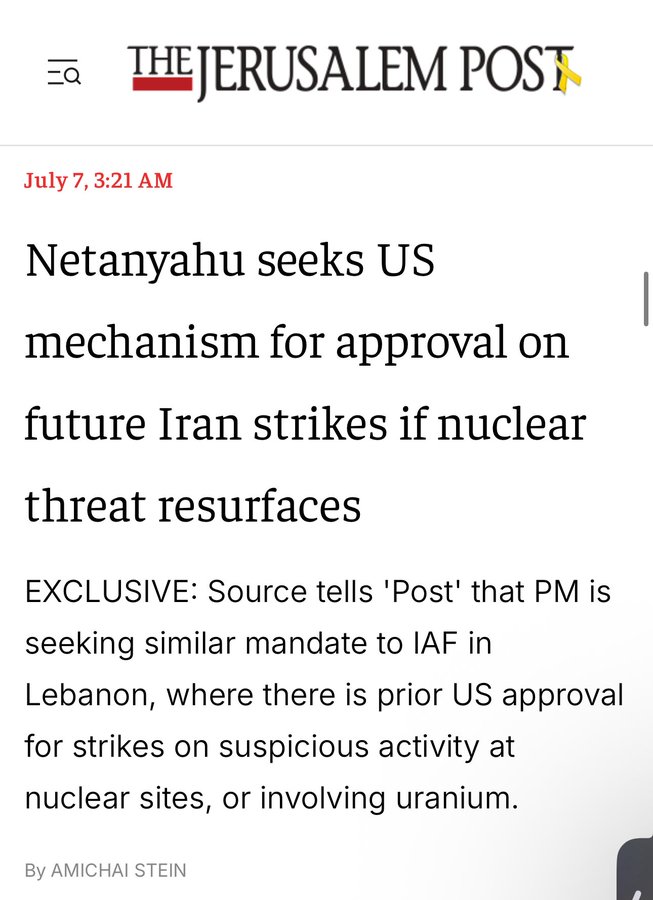
Israel can only be deterred by superior firepower, that should be clear by now. Had Israel known that Iran had a stockpile of nukes at its disposal, they never would have launched their decapitation operation that assassinated numerous scientists, military leaders and politicians. By failing to develop nuclear weapons, Iran invited Israel's aggression. Iran's leaders must accept responsibility for that failure. Had they acted differently and developed the weaponry required for the country's defense, there would have been no 12-day war. Iran's perceived vulnerability prompted Israeli adventurism. This is from an article by Reuters on Wednesday:
Netanyahu wants to use more force, a source familiar with the Israeli leader's thinking said, compelling Tehran-to the point of government collapse if necessary.... Netanyahu wants nothing less than the Libya model for Iran, the source said. That means Iran fully dismantling its nuclear and missile facilities under strict oversight, and renouncing uranium enrichment on its soil even for civilian needs.
Israel is seeking not diplomacy but regime change, Western and regional officials have said. And Netanyahu knows he needs at least a green light from the White House-if not direct backing-to carry out further operations if Tehran refuses to relinquish its nuclear ambitions, they said.....
For Israel, the fallback option is clear, the person familiar with Netanyahu's thinking said: a policy of sustained containment through periodic strikes to prevent any nuclear resurgence. In the wake of its air war against Iran, Israel has reasserted itself as the region's unrivaled military power, more willing than ever to use force and more capable of doing so with precision and relative impunity....
Netanyahu sees a fleeting strategic opportunity, one that demands acceleration, not hesitation, the source close to him said. In his calculus, the time to strike harder is now, before Iran regains its footing, the source said. US, Israel diverge on how to pursue Iran endgame after strikes, diplomats say, Reuters
Iran represents the last obstacle blocking the Zionist dream of a Greater Israel expanding across the Middle East with Jerusalem as its Capitol. Netanyahu will not be deterred from his lifelong ambition of defeating Iran and bringing the resource-rich country under his control.
The current ceasefire is a temporary pause in the hostilities that Israel is using to rebuild his defenses and prepare for the next phase of the war. As you can see from the excerpt above, Netanyahu and his war cabinet are still focused on disarming Iran, toppling its government and obliterating the country the same way they did in Iraq, Syria and Libya. This, in fact, is why Bibi traveled to Washington DC this week, to tell Trump about the changes to his strategy and to request "a green light from the White House to carry out further operations if Tehran refuses to relinquish its nuclear ambitions." Israel wants to be able to bomb Iran whenever it chooses (as it does in Lebanon and Syria) and wants to make sure that Trump "has its back". Bibi believes that if he provokes Tehran with more air strikes, Iran will shower Israel with ballistic missiles forcing Uncle Sam to ride to the rescue. This is Israel's operational strategy, to get the US to fight Israel's war.
What the article doesn't mention, is that Israel will not engage Iran in another slugfest unless it is sure that Iran's ability to retaliate is curtailed. Netanyahu has repeatedly said that he is not going to "get into a war of attrition with Iran". Iran is too well-armed for that. Thus, we must assume that Bibi plans to up-the-ante by either goading Trump into entering the war or by using low-yield, nuclear bunker buster bombs with the intention of scaring Iran into submission. Either way, Round 2 of the conflict is going to be much more destructive and lethal than Round 1. This is from Iran's Deputy Assistant Coordinator of the Revolutionary Guard Ali Fazli:
For many years we have been waiting for the enemy's attack and we were prepared to defend. The "Sejil" missile was unexpected for the enemy. We only used 25% of our missile capability in the recent war. We are today in our best condition in 45 years. We are prepared for long-term defense. We possess knowledge related to nuclear weapons, but our ideological principles do not permit us to use them. Armed forces decisions are not made momentarily, we are working on designing our files and plans. The Zionist entity focused its attacks on security centers in the last day of the war. We have not yet opened the door to any of the missile cities.@ME_Observer_
Bottom line: Iran has not yet used its best and most powerful ballistic missiles. It is patiently awaiting Israel's next attack when it will unload the full force of its state-of-the-art hypersonic missile capability. We should not expect this confrontation to be a gradual tit-for-tat face-off in which both participants exchange blows like prize fighters in a boxing match. We are likely to see swarms of ballistic missiles screeching across the night-sky destroying all manner of military and civilian infrastructure including desalination plants, oil depots, hydroelectric plants, ammonia storage tanks, deep-water ports, international airports and perhaps even Dimona.
The damage could be so widespread and severe, that Israel will no longer survive as a "functioning, modern state". Israel's existence depends entirely on US support.
We're surprised that the media has focused so little attention on Iran's cutting-edge ballistic missiles. After all, it was these projectiles that compelled Israel to seek a ceasefire, so, you'd think, they would attract a little more interest than they have. As we have said before, Iran is a ballistic missile superpower that would undoubtedly prevail in any one-on-one conventional war with Israel. In order to appreciate the technological advances they have made in the last few years, I've posted a few links of You Tube presentations that provide a window into Tehran's impressive capability. (There are many more of these videos)
Iran Uses Its Most Powerful Weapon Sejjil - Iran's Unstoppable Missile, You Tube
How Iran Penetrated Israel's Air Defence; Fattah Hypersonic Missile #iran #israel, You Tube
How Iran is Breaching Israel's Iron Dome Iran Israel War |Firstpost Unpacked |N18G, You Tube
It's worth noting that new technology has often played a decisive role in winning wars in the past. From the invention of gunpowder to the development of machine guns and tanks (World War I); to radar and modern aircraft (World War II), to the development of the first nuclear weapons; technological innovation has played a big role in deciding the outcomes of wars. That same rule will certainly apply here as well. Iran has a decisive edge in ballistic missile and drone technology and will use it to tip the regional balance of power in its favor. The downside of this is that it increases the likelihood that Israel will 'go nuclear' if it looks like it is facing defeat. Of course, Netanyahu may have already considered this possibility and presented his thoughts on the matter (secretly) to the president, suggesting that Trump 'take the lead' and preemptively nuke Iran on Israel's behalf. Check out this excerpt from Philip Giraldi's latest article:
I have my own theory about why Netanyahu will be in Washington.... You see, Bibi wants to establish Israeli hegemony "from the rivers to the sea," which means from the Euphrates, Litani and Nile rivers and all along the seafront with the Mediterranean. That will require regime change in Iran eliminating that nation as an adversary but the recent short war against the Iranians has made it clear that Israel cannot do it alone unless it goes nuclear, which would do possibly fatal damage to Tel Aviv's ability to deal with the rest of the world and could easily mean the de facto end of the Jewish state. So he has to convince a gullible Donald Trump to do it for him and is prepared to lie effusively about the threat posed by Iran to make that happen. Benjamin Netanyahu Is Coming to Town Again, The Unz Review
We agree with Giraldi, in fact, we think that this is why Bibi is in Washington today; to drag the United States into a war with Iran.
So, can war be avoided? Can peace be restored to the Middle East? Can Israel be compelled to restrain itself and stay within its borders?
Yes, yes and yes. But we need to challenge some of the outdated notions about nonproliferation that prevent us from exploring remedies that have a better chance of success. Foremost among these misguided notions is the idea that "Iran must not have a nuclear weapon". The idea is predicated on the belief that once Iran builds a bomb it will go on a tear and obliterate Israel. But-as we'll show-nothing could be further from the truth. Let's take a minute and consider the analysis of the geopolitical analyst that John Mearsheimer called, "The most important international relations theorist of the past 50 years." That's high praise but well deserved by the author of the thought-provoking 2012 commentary Why Iran Should Get The Bomb in Foreign Affairs. Waltz argues that a nuclear-armed Iran could stabilize the Middle East by countering Israel's regional nuclear monopoly. Here's Waltz:
Most U.S., European, and Israeli commentators and policymakers warn that a nuclear-armed Iran would be the worst possible outcome of the current standoff. In fact, it would probably be the best possible result: the one most likely to restore stability in the Middle East.....
"History shows that when countries acquire the bomb, they feel increasingly vulnerable and become acutely aware that their nuclear weapons make them a potential target in the eyes of major powers. This awareness discourages nuclear states from bold and aggressive action....
In no other region of the world does a lone, unchecked nuclear state exist. It is Israel's nuclear arsenal, not Iran's desire for one, that has contributed most to the current crisis. Power, after all, begs to be balanced... Why Iran Should Get The Bomb, Kenneth N. Waltz, Foreign Affairs (Quotes from Grok)
Waltz goes on to say that Israel's nuclear monopoly has increased instability by allowing Israel to attack its regional rivals with impunity forcing its enemies to develop the means by which they can defend themselves. Accordingly, "the current tensions are best viewed not as the early stages of a relatively recent Iranian nuclear crisis but rather as the final stages of a decades-long Middle East nuclear crisis that will only end when a balance of military power is restored."
Waltz also says that a nuclear-armed Iran would reinforce deterrents and, thus, prevent a confrontation with Israel. He persuasively asserts that "there has never been a full-scale war between two nuclear-armed states. In short, a nuclear Iran would lead to a more stable and peaceful Middle East ending this ghastly period of Zionist expansion and carnage.
Here's a short clip of John Mearsheimer stating that "I think there's no question that a nuclear-armed Iran would bring stability to the region, because nuclear weapons are weapons of peace, weapons of deterrents.... And if Iran had a nuclear deterrent, there's no way that the United States or Israel would be threatening to attack Iran, in the same way that if Saddam had had nuclear weapons in 2003, the US would not have invaded Iraq. And if Libya had nuclear weapons in 2011, the US would not have gone to war against Libya. If you had a Middle East where other countries had nuclear weapons besides Israel, you have a more peaceful Middle East. PBS News Hour, You Tube, starts at :48 seconds
Finally-as the Reuters article suggests-Israel is already planning the next phase of its bloody onslaught on Iran. There's no indication that the threat of Iran's ballistic missile stockpile has dampened Israel's resolve at all. Netanyahu and his cronies are as eager as ever to resume hostilities and inflict as much death and destruction on Iran as possible. There is only one thing that will derail Bibi's plan to attack Iran: A nuclear weapon.
Iran should act fast while it still can.
Note-Scott Ritter says Iran is just days away from a nuclear weapon. Intel Roundtable, Scott Ritter, You Tube; 14:30 min
Also, Ritter says Iran weeks away from a bomb, Consortium News
Reprinted with permission from The Unz Review.
